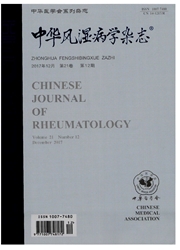

 中文摘要:
中文摘要:
目的:探讨恶性抗磷脂综合征(CAPS)的临床特点及预后,以期提高临床医生对该病的认识及诊治水平。方法:回顾性分析我院风湿科收治的7例恶性抗磷脂综合征患者临床表现、实验室检查及预后等资料并复习相关文献。结果:7例CAPS患者中,1例为原发APS,6例为SLE继发APS。静脉血栓发生5例次,主要是下肢深静脉血栓、眼中央静脉栓塞;动脉血栓13例次,以脑梗死为主(6例次)。6例抗心磷脂抗体阳性,3例抗β2-GPⅠ抗体阳性,3例狼疮抗凝物阳性。5例患者在1周内相继出现心、肺、肾等多器官功能衰竭而导致死亡。结论:CAPS患者短时间内发生大量微血栓形成,可导致多器官功能衰竭。本病的预后差,及早诊断、及时治疗是改善患者预后的关键。
 英文摘要:
英文摘要:
Objective: To investigate the clinical characteristics and prognosis of catastrophic antiphospholipid syndrome (CAPS), in order to improve physicain's recognization. Methods: The clinical manifestations and laboratory examinations of 7 patients with catastrophic antiphospholipid syndrome were analyzed retrospectively. Results: Of 7 CAPS patients, 1 was primary APS and 6 were secondary to SLE. Venous thrombosis occurred in 5 patients, mostly involved deep veins of lower extremities and central veins of retina. Of 13 arterial thrombosis, cerebral infarction (6 times) was the most commom one. Anticardiolipin antibody was positive in 6 patients, anti-beta-2 glycoprotein I antibody was positive in 3 patients, and lupus anticoagulant was positive in 3 patients. Death due to multiple organ failure within one week was seen in 5 patients. Conclusion: CAPS is characterized by development of extensive microvascular thromboses in multiple organs, occurring simultaneously or within a short period of time and causing multiple organ failure. As CAPS had high mortality, early diagnosis and treatment play key roles for improving the prognosis of CAPS.
 同期刊论文项目
同期刊论文项目
 同项目期刊论文
同项目期刊论文
 Association between anti-beta 2 glycoprotein I antibodies and renal glomerular C4d deposition in lup
Association between anti-beta 2 glycoprotein I antibodies and renal glomerular C4d deposition in lup Antiphospholipid antibody profiles in lupus nephritis with glomerular microthrombosis: a prospective
Antiphospholipid antibody profiles in lupus nephritis with glomerular microthrombosis: a prospective 期刊信息
期刊信息
